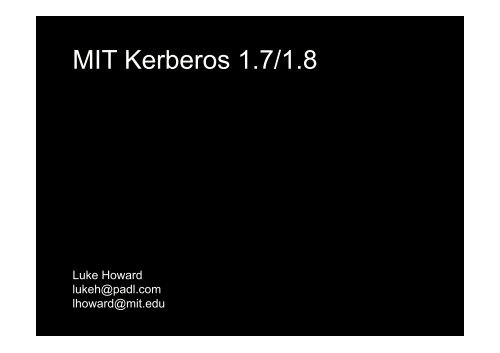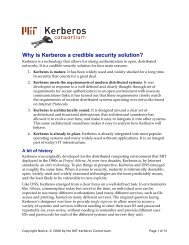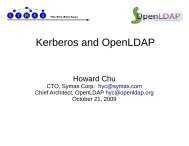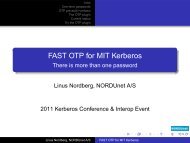slides Luke Howard - MIT Kerberos Consortium
slides Luke Howard - MIT Kerberos Consortium
slides Luke Howard - MIT Kerberos Consortium
- No tags were found...
Create successful ePaper yourself
Turn your PDF publications into a flip-book with our unique Google optimized e-Paper software.
Introduction• Founder, PADL• RFC 2307• Novell DSfW (née XAD)• Consultant, <strong>MIT</strong>• <strong>Kerberos</strong> 1.7– Windows interop– Developed whilst at Novell July 2006,open sourced December 2008• <strong>Kerberos</strong> 1.8• AES-CCM
Referrals• draft-ietf-krb-wg-kerberos-referrals• KDB backend can return a different principalto that requested• KDC does not proscribe information model• Support in LDAP backend (better in 1.8)• Client library support (better in 1.8)• Windows interop– Canonicalise client if requested in AS-REQ– Only canonicalize TGS server name in AS-REQ
RFC 3244 (set password)• Support password change over TCP• Support set password• Subject to same ACLs as kadm5 clients
RFC 4537 (enctype nego)• Client proposes enctypes in AP-REQauthdata• If server chooses a different enctype,a subkey with this enctype is returned• Permits clients and servers to use newenctypes without upgrading KDC
gss_wrap_iov• #include • Modelled on SSPI EncryptMessage• Principally for Windows RPC interop• Multiple buffer, in-place encryption• Associated data buffers (AEAD)• Flexible arrangement of input buffers• HEADER | SIGN_DATA | DATA | PADDING | TRAILER• PADDING and TRAILER are optional for DCE• Unwrap without understanding buffer boundaries• STREAM | SIGN_DATA | DATA• gss_wrap_aead provides a simplified API for a singleencrypt, single assoc buffer
GGF extensions• Buffer sets• Mechanism-specific glue APIs/SPIs– gss_inquire_sec_context_by_oid– gss_inquire_cred_by_oid– gss_set_sec_context_option• Mechanism-specific glue SPIs– gssspi_set_cred_option– gssspi_mech_invoke
GSS_C_DCE_STYLE• RFC 4757• Used by Microsoft RPC <strong>Kerberos</strong> mech• Avoids replay cache requirement byalways requiring client and server to provesession key knowledge• Varied token format– Context tokens omit GSS framing– Wrap tokens omit variable length encoding
GSS_C_INQ_SSPI_SESSION_KEY• Exposes session key for MS interop– CIFS– DRS– Not for general purpose use!• gss_inquire_sec_context_by_oid(GSS_C_INQ_SSPI_SESSION_KEY)• Buffer set contains– [0] Session key– [1] <strong>Kerberos</strong> encryption type as OID
GSS authdata API• Based on Heimdal APIs• <strong>Kerberos</strong> mechanism specific• gsskrb5_extract_authz_data_from_sec_context• gsskrb5_extract_authtime_from_sec_context• Requires caller to explicitly verify MS PAC(this differs from Heimdal)• Wait for 1.8 and use naming extensions– These do the heavy lifting for you
MS PAC APIs• Based on Heimdal APIs• krb5_pac_parse• krb5_pac_get_types• krb5_pac_get_buffer• krb5_pac_add_buffer• krb5_pac_verify• krb5int_pac_sign• krb5_pac_free
Mechglue SPI• Dynamic loading of GSS mechanisms– Export dispatch table– Export GSS APIs• Support for new APIs and SPIs• Specific NTLM support• SPNEGO interop with Samba• Mechanism can implement gss_wrap_iov– gss_wrap– gss_wrap_aead
KDC authdata V1/V2 SPI• Extended version of V0 SPI from 1.6• Supports TGS-REQ as well as AS-REQ• Built-in methods– Copy TGT authdata– Invoke DB authdata SPI– Invoke V0 SPI plugins• Interface is unstable: V1 in 1.7, V2 in 1.8• Plugin called with– Client, server, TGS DB entry– Encoded and decoded request– Services4User information– Reply• KRB5-PADATA-PAC-REQUEST
KDC mech invoke• #include • KDC to KDB backend private interface– Add new methods to KDB SPI without changingvtable– Avoids updating every backend, kadm5, etc• Sign authdata– Similar to V1 SPI, for KDB backends that issueauthdata• Check transited realms• Check policy before processing request• Audit after processing request• Check constrained delegation policy
Services4User in KDC• Protocol transition (S4U2Self)– Service can get a ticket to itselfon behalf of any principal– May use ticket for constrained delegation subject topolicy– W2K3 variant only (W2K8 in 1.8)• Constrained delegation (S4U2Proxy)– S1 wishes to authenticate to S2 on behalf of C– TGS-REQ { S1, S2, STkt(C, S1) }– TGS-REP { STkt(C, S2) }– Requires AD-like (DSfW) backend• KDC-side support only– 1.8 has client library (service) support
1.8• Services4User GSS API• Naming extensions• Principal lockout• HDB shim
Services4User GSS API• gss_acquire_cred_impersonate_name– Protocol transition– Returns a credential handle given a name• gss_accept_sec_context– Constrained delegation– Always returns a delegated cred handle if• deleg_cred_handle != NULL• verifier_cred_handle has GSS_C_BOTH usage– No application changes required– Actual S4U2Proxy request done at context init• krb5 API is not exposed• No certificate protocol transition support yet
Naming extensions• draft-ietf-kitten-naming-exts• Attribute-based API for interrogating and setting authorizationinformation– gss_inquire_name– gss_get_name_attribute– gss_set_name_attribute– …• Attribute names are URIs (eg. urn:mspac:logon-info)• Known authdata elements are always verified, however:• Caller should check authenticated flag on returned attribute• Builtin support for MS PAC• krb5 SPI layer for new authdata types• Sample code for AD-KDCIssuedkrb5 and KDC plugins for positive authdata• Attributes set on initiator cred handle are sent in AP-REQ
Principal lockout• Lock principal out after a certain number of preauthenticationfailures• Roughly follow Windows / LDAP password policy model• DB2 and LDAP support– DB2 lockout attributes are non-replicated• Reuses existing KDB attributes– last_success– last_failed– fail_auth_count• Extensions for lockout policy– pw_max_fail– pw_failcnt_interval (period after which fail_auth_count reset)– pw_lockout_duration (period after which account unlocked)• Uses policy/audit hooks introduced in 1.7• Changes to kadm5 and replication protocols
HDB bridge• Load Heimdal database backends• Also loads Heimdal windc plugins– windc_pac_generate– windc_pac_verify– windc_client_access• Read/write support• Samba4 with <strong>MIT</strong> KDC• Test migrations• kdb5_util dump –mkey_convert
Post-1.8: AES-CCM• RFC 5116 section 5.3 / NIST 800-38– ENCTYPE_AES128_CCM_128– ENCTYPE_AES256_CCM_128• Key derivation– Kc = DK(base-key, usage | 0xCC)• AEAD• Nonce/payload length is parameterized• CCM implementation is cipher agnostic• src/lib/crypto/krb/dk/dk_ccm.c• New ciphers need only implement counter mode• Tested with DCE RPC GSS mechanism• users/lhoward/aes-ccm branch
1.7 references• http://k5wiki.kerberos.org/wiki/Projects/DBAliases• http://k5wiki.kerberos.org/wiki/Projects/Aliases• http://k5wiki.kerberos.org/wiki/Projects/RFC_3244• http://k5wiki.kerberos.org/wiki/Projects/RFC_4537• http://k5wiki.kerberos.org/wiki/Projects/AEAD_encryption_API• http://k5wiki.kerberos.org/wiki/Projects/GSSAPI_DCE• http://k5wiki.kerberos.org/wiki/Projects/PAC_and_principal_APIs• http://k5wiki.kerberos.org/wiki/Projects/GSS-API_mechanism_plug-in_support
1.8 references• http://k5wiki.kerberos.org/wiki/Projects/Services4User• http://k5wiki.kerberos.org/wiki/Projects/VerifyAuthData• http://k5wiki.kerberos.org/wiki/Projects/Lockout• http://k5wiki.kerberos.org/wiki/Projects/HDBBridge
Questions





